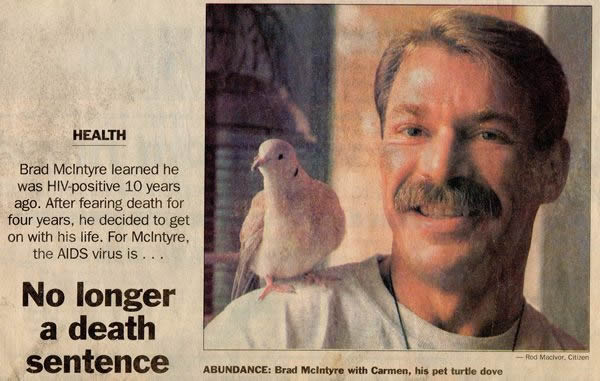No longer a death sentence
by Elaine Medline Health Writer

Image: Bradford McIntyre - No Longer a death sentence.
- Abundance: Brad McIntyre with Carmen, his pet turtle dove.
Photo by Rod MacIvor - Ottawa Citizen.
The Ottawa Citizen
Thursday, October 20, 1994
Brad McIntyre learned he was HIV positive 10 years ago. After fearing death for four years, he decided to get on with his life. For McIntyre, the AIDS virus is… No longer a death sentence
Brad McIntyre held a party for his friends last November and presented each with an award, a gift of crystal. One friend was honored with Most Instrumental. Another was named Best Support.
McIntyre, 42, has lived with HIV for almost a decade, and to him it’s not a death sentence any more.
The first four years were a living hell, he remembers, mainly because he was afraid of death. But then, after a friend told him he had suffered long enough and hard enough, he slapped some bright paint on his beige apartment walls. He chose to get on with his life.
Fear is something we create, and he has uncreated it, says McIntyre as soothing New Age music plays in the background and his turtle dove Carmen flits along the top of the couch. Facing a life-threatening illness makes you appreciate life, he says.
McIntyre was diagnosed with the virus linked to AIDS and on Nov. 28th, 1985, given six months to live and told by his doctor to arrange his finances and funeral. On the anniversary of his diagnosis every year, he now organizes a party, a celebration of life.
Dr. Gary Garber, head of the AIDS clinic at the Ottawa General Hospital, says having the human Immunodeficiency virus (HIV) is often equated with death, but instead the disease should be regarded as a chronic illness, during which patients can live full lives.
He says drugs such as preventative antibiotics have helped improve the life span of AIDS patients, warding off killer infections like pneumonia.
Living longer now often means dying later of conditions that are more difficult to treat, such as AIDS-related dementia and cancer, he says.
About 10 years after exposure to HIV, only half the patients have developed full-blown AIDS, and after that patients are alive for about three to four more years, says Garber.
It's not known why some people live longer than others, but it's hypothesized they may have less of the virus in their bodies from the start, or a stronger immune system.
Nine years ago, Brad McIntyre left his home in Kitchener-Waterloo because he didnt want his family and friends to witness
him suffer through his illness. He came to Ottawa to die; yet he didn’t so he had to find a job.
At Rinaldo’'s in downtown Ottawa, he found work as a stylist. He says the drug AZT gave him neuropathy in his legs, insomnia, headaches and nausea, so he had to quit.
After he went off the drugs, he felt better and returned to work, but fatigue forced him to quit again. His employer, like his sister and two brothers, has been understanding, he says.
McIntyre has experienced swollen lymph glands, an infection called shingles and severe fatigue, but says he has not been diagnosed with full-blown AIDS.
On disability benefits now, he spends some of his time biking and walking by the Ottawa River. He had to learn to be strong as a young teenager when he discovered he was gay: others made fun of him because he was different.
He’'s not in a relationship but doesn’t miss it because he gets so much love from friends. “I’m happier than I have ever been in my life.”
His friend Lisa Kenkel, a former client at the hair salon, says McIntyre has his ups and downs like anyone else, but never asks, “why me?” She says he takes everything as it comes and just has a blast. “I’ve never seen him in a state where he’s given up the struggle,” she says.
Now, McIntyre is into alternative treatments such as special additions to his diet, meditation and visualization, where he says he “awakens his cellular memory by creating a vibration of light or energy.”He’s on a mission to share his
various methods with others which he says are not promoted by the medical profession.
Garber says some alternative therapies might be beneficial, but others could be harmful and he feels they should be more vigorously tested before being espoused.
Serge Beaudoin, a councellor with the AIDS Committee of Ottawa, says it’s tough for AIDS patients to be hopeful when they
begin getting AIDS related infections, but “they go from one infection to the other heroically.”bAfter developing
a severe illness, some people gain a sense of purpose in their lives, he says.
McIntyre’s place is overrun by gifts from friends–golden deer statuettes, vases, and a plaster of paris replication of his chest and arms. He has collected stones and placed them in a pitcher of water to preserve their color.
And what does the future hold? “Oh,” he answers with relish, a smile appearing below his bushy moustache on his tanned face. “Abundance.” On his answering machine, he promises to get back to you as sure as the sun shines.
###
No longer a death sentence
By Elaine Medline Health Writer
Published in the Ottawa Citizen
October 20, 1994
"Reproduced with permission - Ottawa Citizen"
Ottawa Citizen
See: 'HIV diagnosis gives man wake-up call'
by Susan Riley
Published in the Ottawa Citizen
November 30, 1994
|